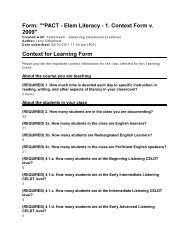The Tutoring Book - California State University, Sacramento
The Tutoring Book - California State University, Sacramento
The Tutoring Book - California State University, Sacramento
Create successful ePaper yourself
Turn your PDF publications into a flip-book with our unique Google optimized e-Paper software.
Step 2: Learning to Praise Equally<br />
While many composition scholars and instructors acknowledge the positive effects praise has on student<br />
writing, many do not even recognize that their praise often does not seem to be dispersed equally. In fact,<br />
throughout my time at the Writing Center, I have noticed that individuals seem much more likely to praise<br />
students that they consider to be weaker writers than students characterized as strong writers. What<br />
causes this inequality in the dispersion of praise and why do we differentiate between the achievements of<br />
more- and less-able writers?<br />
After recording some of my recent tutoring sessions, I noted that I praise “weak” writers twice as<br />
much on average than students whose writing I consider stronger or less error-filled. I especially neglect<br />
to praise students with only low-order concerns on their papers compared to students who still need<br />
assistance with the fundamentals of writing such as organization, analysis, and support. However, while I<br />
do not consciously recognize that I refrain from praising students with stronger writing skills, I wonder to<br />
what extent I am actually impeding their growth as writers by withholding praise or by praising them only<br />
for truly outstanding work?<br />
In a 1972 study conducted by Thomas Gee, the author found that “students whose composition<br />
received either criticism alone or no commentary at all developed significantly more negative attitudes<br />
toward writing than students whose composition received only praise” ( Daiker 156). Moreover, Gee’s<br />
study determined that after only four weeks, “students who received only negative comments or none at<br />
all were writing papers significantly shorter than those of students who were praised” (Daiker 156). As<br />
this study proves, even a lack of praise seems to have negative consequences on the quality of students’<br />
work; therefore, it seems crucial that even strong writers receive acknowledgement for their<br />
accomplishments because failure to provide such support may in fact be crippling their desire to continue<br />
writing at the same level of excellence.<br />
Step 3: Making Praise an Everyday Habit<br />
Now that you have learned the importance of praising students in an equal manner, regardless of their<br />
level of ability, there are a few additional reminders that will aid you in best utilizing praise as a means of<br />
positive reinforcement.<br />
Reminder 1: Allow Students to Experience Success on a Consistent Basis<br />
As Daiker notes, “since positive reinforcement, or its lack, is so crucial to a student’s level of writing<br />
apprehension,” one way to reduce this apprehension and support writers regardless of their skill level, “is<br />
by allowing [all] students to experience success with writing” on a consistent bases (156). Tutors can<br />
immediately implement this change by becoming more aware of themselves as individuals whose positive<br />
feedback affects the confidence of students and consequentially their work as writers. Every student<br />
should have the opportunity to experience success as a writer and, while it may be more difficult to find<br />
moments of praise in the work of strong writers, there are always areas that improve in their work and<br />
therefore deserve recognition. For instance, students who are strong writers often will attempt to use<br />
language in innovative, very personal ways in order to establish their identity as authors. Tutors should<br />
praise students for such an attempt (even if it fails) because the student at least made the effort to<br />
experiment with style, voice, tone, etc… In addition, you can always praise students for insights that are<br />
especially well-articulated or profound or that teach you new ways of looking at the material or at the<br />
world.<br />
Reminder 2: Praise Needs to Be Genuine to be Effective<br />
Regardless of what you choose to praise in your student’s writing remember that the praise needs to be<br />
genuine and paper-specific. As Nancy Sommers notes in “Responding to Student Writing,” “most<br />
47

















